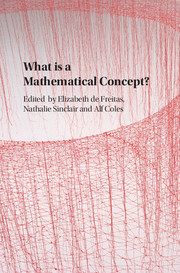Book contents
- What Is a Mathematical Concept?
- What Is a Mathematical Concept?
- Copyright page
- Contents
- Images
- Notes on Contributors
- Introduction
- Part I
- Part II
- Part III
- Part IV
- Part V
- 9 Queering Mathematical Concepts
- 10 Mathematics Concepts in the News
- 11 Concepts and Commodities in Mathematical Learning
- Part VI
- Part VII
- Part VIII
- Index
- References
9 - Queering Mathematical Concepts
from Part V
Published online by Cambridge University Press: 26 July 2017
- What Is a Mathematical Concept?
- What Is a Mathematical Concept?
- Copyright page
- Contents
- Images
- Notes on Contributors
- Introduction
- Part I
- Part II
- Part III
- Part IV
- Part V
- 9 Queering Mathematical Concepts
- 10 Mathematics Concepts in the News
- 11 Concepts and Commodities in Mathematical Learning
- Part VI
- Part VII
- Part VIII
- Index
- References
Information
- Type
- Chapter
- Information
- What is a Mathematical Concept? , pp. 161 - 174Publisher: Cambridge University PressPrint publication year: 2017
